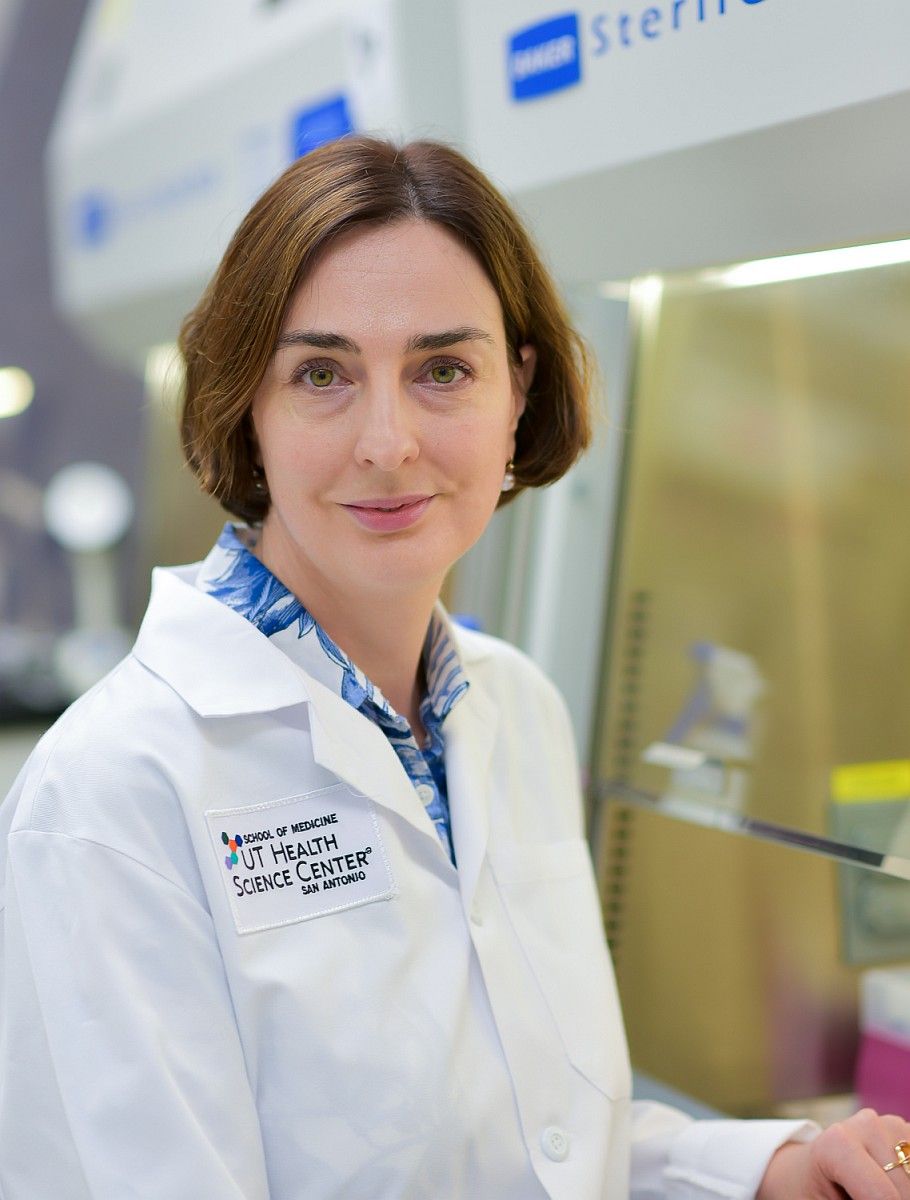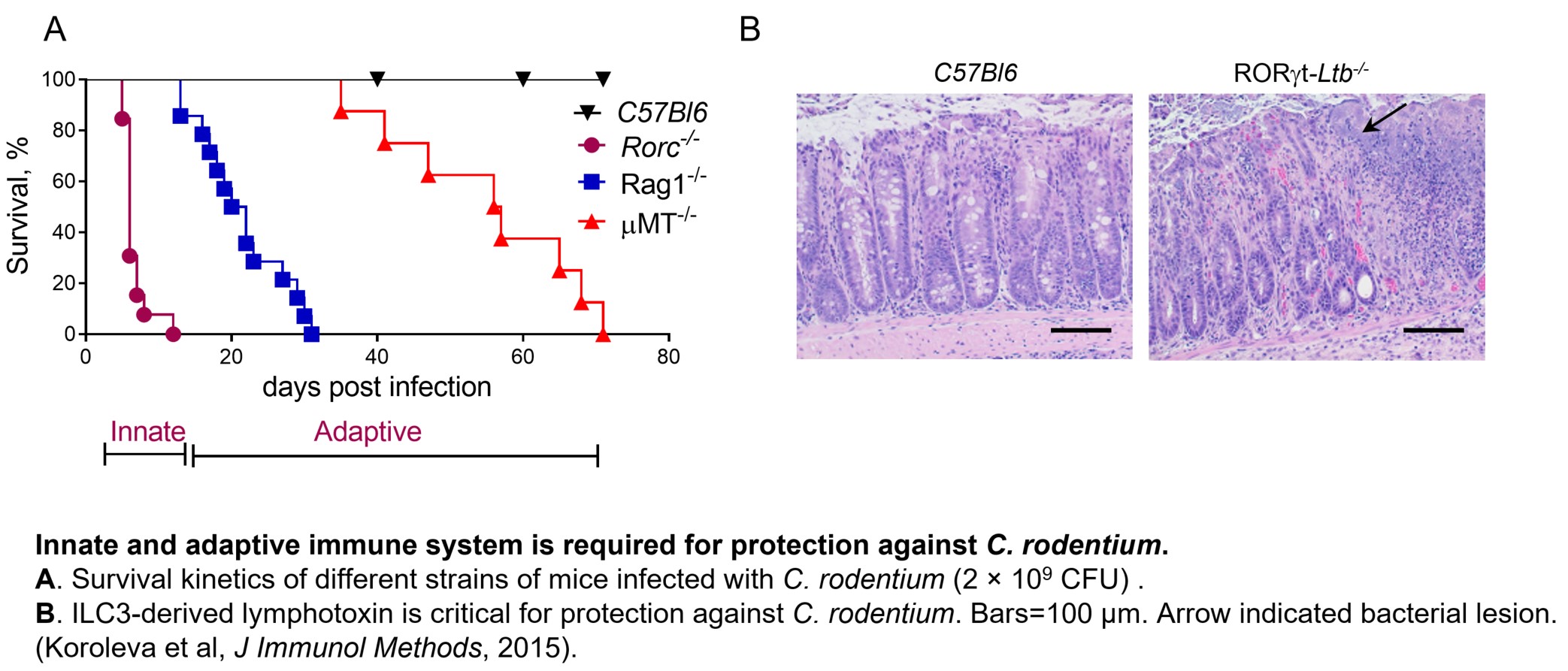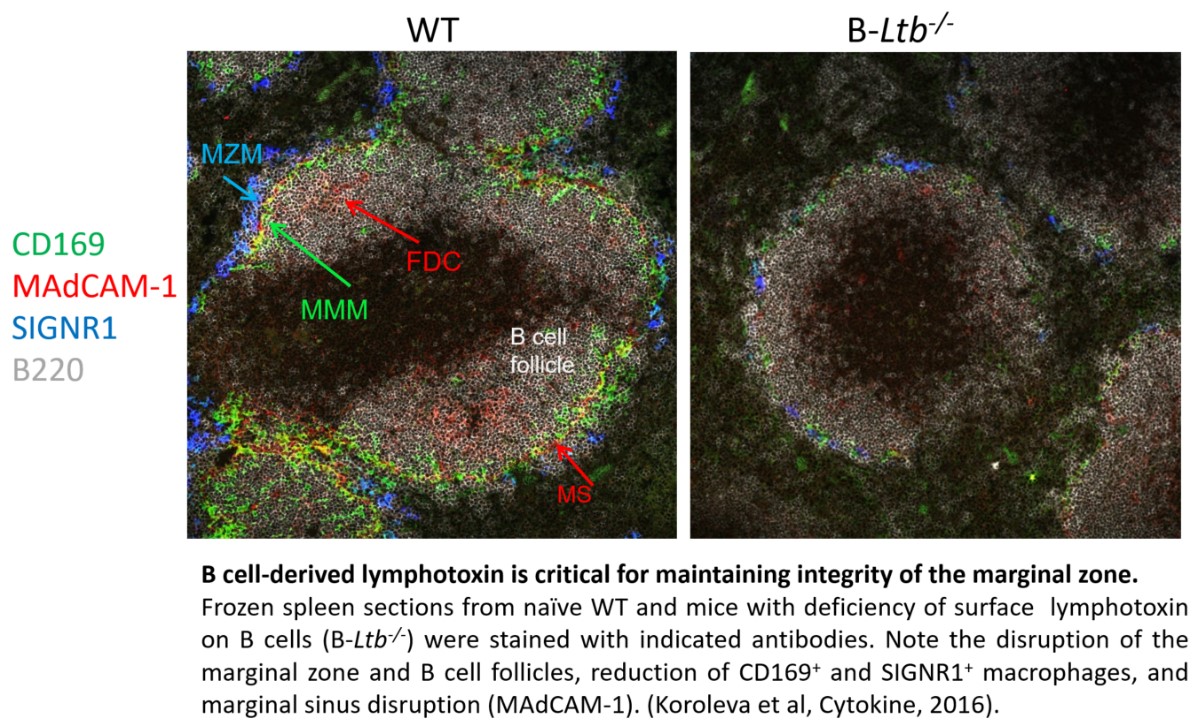
Contact
- (210) 450-8160
- Koroleva@uthscsa.edu
Department
Microbiology, Immunology & Molecular GeneticsKoroleva, Ekaterina, Ph.D.
Assistant Professor
Personal Statement:
The focus of Dr. Ekaterina Koroleva`s research is the regulation of mucosal immunity and cancer. She is interested how the immune system regulates protective and pathogenic responses at mucosal barriers. The long-term goal of Dr. Koroleva`s research program is to apply knowledge gained in animal models for the development of new immune-based therapies for infectious diseases and cancer.
Dr. Koroleva graduated from Moscow State University, Russia, and did her PhD. work in the laboratory of Dr. Sergei Nedospasov at the Engelhardt Institute of Molecular Biology. Her graduate work was focused on identification and characterization of novel human cancer antigens. Dr. Koroleva did her postdoctoral training in Dr. Yang-Xin Fu laboratory at the University of Chicago working on the role of lymphotoxin cytokine in regulation of liver homeostasis. In 2011, she joined the laboratory of Dr. Alexei Tumanov at the Trudeau Institute, NY. Her research was focused on the role of innate lymphoid cells in the regulation of intestinal inflammation. Dr. Koroleva was recruited to the Department of Microbiology, Immunology, and Molecular Genetics as an Assistant Professor/Research in Fall 2016.
Education
M.S. Moscow State University, Department of Biology, Moscow, Russia
“Oncoimmunology” Educational Program in Immunology and Cancer Biology, Cancer Research Institute and Moscow State University (www.oncoimmunology.ru)
Ph.D., Molecular Biology, Engelhardt Institute of Molecular Biology, Russian Academy of Sciences, Moscow, Russia
Research
My research is focused on understanding the biology of lymphotoxin, member of tumor necrosis factor family of cytokines in homeostatic conditions and in disease. Over the last decade we have generated various mouse models specifically targeting lymphotoxin pathway. Our recent studies revealed an exciting link between lymphotoxin and regulation of group 3 innate lymphoid cells (ILCs) for protection against intestinal inflammation and mucosal bacterial pathogens, such as Citrobacter rodentium, which mimics human pathogenic E. coli enteric infections. I am currently working on understanding the role of lymphotoxin pathway in intestinal inflammation and colorectal cancer. The goal of this project is to uncover cellular and molecular LTβR-mediated mechanisms controlling intestinal inflammation and colorectal cancer, and to develop immunotherapeutic strategy for disease treatment.


Awards & Accomplishments
1997 Honors Diploma, Moscow State University, Moscow, Russia
1999 International Union Against Cancer (UICC) Fellowship
2000 Ph.D. Student Award. Soros International Scientific Educational Program
2001 Ph.D. Student Award, Engelhardt Institute of Molecular Biology, Moscow, Russia
2003 Young Scientist Award, Russian Foundation for Basic Research
2008 Cardiovascular Pathophysiology and Biochemistry Training Fellowship
2015 Clarkson University/Trudeau Institute Partnership (CUTIP) Award
Publications
List of publications in PubMed:
https://www.ncbi.nlm.nih.gov/pubmed/?term=Koroleva+EP%5Bauthor%5D
Schaeuble K, Britschgi M.R., Scarpellino L., Favre S., Xu Y., Koroleva E., Lissandrin T.K.A., Link A., Matloubian M., Ware C.F., Nedospasov S.A., Tumanov A.V., Cyster J.G., Luther S.A. Perivascular fibroblasts of the developing spleen act as LTα1β2-dependent precursors of both T and B zone organizer cells. Cell Rep. 2017 Nov 28, 21(9):2500-2514, 2017.
Gubernatorova E.O. Liu X, Othman A, Muraoka WT, Koroleva EP, Andreescu S, Tumanov A.V. Europeum-doped Cerium Oxide nanoparticles limit reactive oxygen species formation and ameliorate intestinal ischemia-reperfusion injury. Adv Healthc Mater. 2017 May 8. doi; 10.1002/adhm.201700176.
Koroleva E.P., Fu Y.X., Tumanov A.V. Lymphotoxin in physiology of lymphoid tissues – Implication for antiviral defense. Cytokine. Sep 9. pii: S1043-4666(16)30472-0, 2016.
Gubernatorova E.O., Koroleva E.P., Halperin S., Perez-Chanona E., Jobin C., Tumanov A.V. Murine model of intestinal ischemia-reperfusion injury. J Vis Exp, e53881, doi:10.3791/53881, 2016.
Koroleva E.P., Halperin S., Gubernatorova E.O., Spencer C.M, Tumanov A.V. Citrobacter rodentium- induced colitis: a robust model to study mucosal immune responses in the gut. J Immunol Methods, 2015, 421:61-72.
Macho-Fernandez E.*, Koroleva E.P.*, Spencer C.M., Tighe M., Torrado E., Cooper A.M, Fu Y-X, Tumanov A.V. Lymphotoxin beta receptor signaling limits mucosal damage through driving IL-23 production by epithelial cells. Mucosal Immunol, 2015 Mar;8(2):403-13. *-contributed equally
Chellan B., Koroleva E.P., Sontag T.J., Tumanov A.V., Fu Y-X, Getz G.S., Reardon C. A.. LIGHT/TNFSR14 can regulate hepatic lipase expression by hepatocytes independent of T cells and Kupffer cells. PLoS One. 2013; 8(1): e54719.
Upadhyay V., Poroyko V., Kim T.J., Devkota S., Fu S., Liu D., Tumanov A.V., Koroleva E.P., Deng L., Nagler C., E. B. Chang, H. Tang, Y. X. Fu. Lymphotoxin regulates commensal responses to enable diet-induced obesity. Nat Immunol., 13(10): 947-53, 2012.
Tumanov AV, Koroleva E.P., Guo X, Wang Y, Kruglov A, Nedospasov S, Fu Y-X. Lymphotoxin controls the IL-22 protection pathway in gut innate lymphoid cells during mucosal pathogen challenge. Cell Host Microbe, 10(1):44-53, 2011.
Wang Y., Koroleva E.P., Kruglov A.A., Kuprash D.V., Nedospasov S.A., Fu Y-X, Tumanov A.V. Lymphotoxin beta receptor signaling in intestinal epithelial cells orchestrates innate immune responses against mucosal bacterial infection. Immunity, 32(3): 403-13, 2010.
Tumanov A. V., Grivennikov S.I., Kruglov A.A., Shebzukhov Y.V., Koroleva E.P., Piao Y., Cui X-Y., Littman D.R., Kuprash D.V. Nedospasov S.A. Cellular source and molecular form of TNF specify its distinct functions in organization of secondary lymphoid organs. Blood, 116 (18):3456-64, 2010.
Tumanov A.V., Koroleva E.P., Christiansen P.A., Khan M.A., Ruddy M.J., Burnette B., Papa S., Franzoso G., Nedospasov S., Fu Y-X., Anders R.A. T cell derived lymphotoxin regulates liver regeneration. Gastroenterology, 136(2):694-704, 2009.
Shebzukhov Y.V., Koroleva E.P., Khlgatian S.V., Belousov P.V., Sazykin A.Y., Kadachigova T.S., Pomerantseva E.A., Lagarkova M.A., Nedospasov S.A., Kuprash D.V.RAP80/UIMC1 as cancer-associated antigen: alternative splice variants and their immunogenicity. Cancer Lett. 2007 Oct 8;255(2):255-62.
Shebzukhov Y.V.*, Koroleva E.P.*, Khlgatian S.V., Belousov P.V., Kuzmina K.E., Radko B.V., Longpre F., Lagarkova M.A., Kadachigova T.S., Gurova O.V., Meshcheryakov A.A., Lichinitser M.R., Knuth A., Jager E., Kuprash D.V., Nedospasov S.A. Antibody response to a non-conserved C-terminal part of human histone deacetylase 3 in colon cancer patients. Int J Cancer. 2005 Dec 10;117(5):800-6. *-contributed equally.
Koroleva E.P., Lagarkova M.A., Khlgatian SV, Shebzukhov IuV, Meshcheriakov AA, Lichinitser MR, Nedospasov SA, Kuprash DV. Serological study of a repertoire of human cancer antigens and autoantigens. Molecular Biology (Mosk). 2004 Mar-Apr;38(2):233-8.
Koroleva E.P., Lagarkova M.A., Mesheryakov A.A., Scanlan M.J., Old L.J., Nedospasov S.A., Kuprash DV. Serological identification of antigens associated with renal cell carcinoma. Rus J Immunol. 2002 Oct;7(3):229-38.
